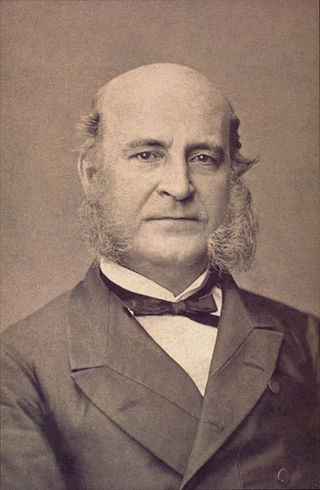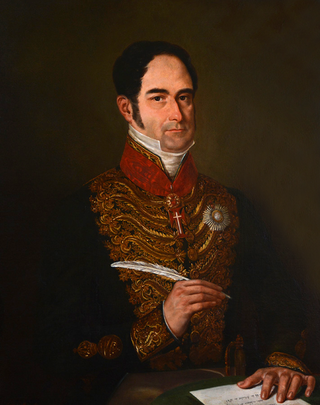Contents
| 1871 in Brazil |
|---|
| Flag |
 20 stars (1871–89) |
| Timeline of Brazilian history |
| Empire of Brazil |
| Year of Constitution: 1824 |
Events from the year 1871 in Brazil .
| 1871 in Brazil |
|---|
| Flag |
 20 stars (1871–89) |
| Timeline of Brazilian history |
| Empire of Brazil |
| Year of Constitution: 1824 |
Events from the year 1871 in Brazil .

Afonso Augusto Moreira Pena, often referred to as Afonso Pena, was a Brazilian lawyer, professor, and politician who served as the 6th president of Brazil, from 1906 until his death in 1909. Pena was elected in 1906, the chosen successor of president Rodrigues Alves. Pena was the first politician from Minas Gerais to win the presidency, ending the series of politicians from São Paulo who had held the presidency since 1894. Before his presidency, he served as the 4th Vice President of Brazil, under Rodrigues Alves (1903–1906) after the death of Silviano Brandão. Pena was a monarchist. He was the only member of Emperor Pedro II's cabinet to become president of Brazil and the first Brazilian president to die in office.

José Maria da Silva Paranhos Júnior, Baron of Rio Branco was a Brazilian noble, diplomat, geographer, historian, politician and professor, considered to be the "father of Brazilian diplomacy". He was the son of statesman José Paranhos, Viscount of Rio Branco. The Baron of Rio Branco was a member of the Brazilian Academy of Letters, occupying its 34th chair from 1898 until his death in 1912. As a representative of Brazil, he managed to peacefully resolve all Brazil's border disputes with its South American neighbours and incorporate 900 thousand square kilometers through his diplomacy alone.

Alfredo Maria Adriano d'Escragnolle Taunay, Viscount of Taunay, was a Brazilian writer, musician, professor, military engineer, historian, politician, sociologist and nobleman. He is famous for the regionalist novel Inocência, considered a major forerunner of naturalism in Brazil, and for A Retirada da Laguna, an account of an episode in the Paraguayan War. The Brazilianist Leslie Bethell has described it as "the one undoubted literary masterpiece produced by the Paraguayan War".

The Rio Branco law, also known as the Law of Free Birth, named after its champion, prime minister José Paranhos, Viscount of Rio Branco, was passed by the General Assembly of the Empire of Brazil on 28 September 1871. It was intended to grant freedom to all newborn children of slaves, and slaves of the state or crown. However, children of enslaved women in Brazil were obligated to serve their mother's owners until the age of 21, a condition that was often more or less that of slavery. The law did not define the exact legal status of enslaved women's wombs; this was negotiated by enslaved people afterwards, with women at the forefront.

Luís Alves de Lima e Silva, Duke of Caxias, nicknamed "the Peacemaker" and "the Iron Duke", was an army officer, politician and monarchist of the Empire of Brazil. Like his father and uncles, Caxias pursued a military career. In 1823 he fought as a young officer in the Brazilian War for Independence against Portugal, then spent three years in Brazil's southernmost province, Cisplatina, as the government unsuccessfully resisted that province's secession in the Cisplatine War. Though his own father and uncles renounced Emperor Dom Pedro I during the protests of 1831, Caxias remained loyal. Pedro I abdicated in favor of his young son Dom Pedro II, whom Caxias instructed in swordsmanship and horsemanship and eventually befriended.

José Maria da Silva Paranhos, Viscount of Rio Branco, was a Brazilian politician, monarchist, diplomat, teacher and journalist. Rio Branco was born in Salvador, in what was then the Captaincy of Bahia, to a wealthy family, but most of the fortune was lost after his parents' deaths early in his childhood. In 1871, Rio Branco became the president of the Council of Ministers for the first time. He would become the Council's longest-serving president, and his cabinet the second longest, in Brazilian history. His government was marked by a time of economic prosperity and the enactment of several reforms. The most important of these initiatives was the Law of Free Birth, which granted freeborn status to children born to slave women. Rio Branco led the government that enacted this law, and its passage increased his popularity. His government was plagued by a long crisis with the Catholic Church that resulted from the expulsion of Freemasons from its lay brotherhoods. After more than four years heading the Cabinet, Rio Branco resigned in 1875. Following a long vacation in Europe, his health swiftly declined and he was diagnosed with oral cancer. Rio Branco died in 1880 and was widely mourned throughout the country. He is regarded by most historians as one of Brazil's greatest statesmen.

The Imperial Order of the Rose was a Brazilian order of chivalry, instituted by Emperor Pedro I of Brazil on 17 October 1829 to commemorate his marriage to Amélie of Leuchtenberg.

Pedro de Araújo Lima, Marquis of Olinda was a politician and monarchist of the Empire of Brazil. His long political career spanned the reigns of John VI, Pedro I and Pedro II. He was also one of the founders of the Brazilian Conservative Party.

The São Francisco Xavier Cemetery is the largest of the many necropolises that make up the group popularly known as the Caju Cemetery, located in the Caju neighborhood of Rio de Janeiro's North Zone. It is the largest cemetery in the state of Rio de Janeiro, covering 441,000 m2, and one of the largest in Brazil. The other cemeteries that make up the group of necropolises are the Cemetery of the Third Order of Carmel, the Cemetery of the Venerable Third Order of St. Francis of Penance and the Jewish Communal Cemetery of Caju. It was officially founded on 18 October 1851, in the same place where a slave cemetery had existed since 1839, and has been administered by the Concessionária Reviver since 2015, after more than 150 years of administration by the Santa Casa de Misericórdia [Holy House of Mercy].

Manuel Alves Branco, the 2nd Viscount of Caravelas was a Brazilian politician, economist, and magistrate during the Empire of Brazil (1822–1889). He held the positions of general deputy, minister of justice, minister of finance, senator and was also the first de jure prime-minister of Brazil.

Events in the year 1899 in Brazil.

Events in the year 1902 in Brazil.

Events in the year 1918 in Brazil.

Events in the year 1891 in Brazil.

Events in the year 1924 in Brazil.

Events in the year 1927 in Brazil.

Events in the year 1942 in Brazil.

Events in the year 1966 in Brazil.

The history of abolitionism in Brazil goes back to the first attempt to abolish indigenous slavery in Brazil, in 1611, to its definitive abolition by the Marquis of Pombal, in 1755 and 1758, during the reign of King Joseph I, and to the emancipation movements in the colonial period, particularly the 1798 Bahian Conspiracy, whose plans included the eradication of slavery. After the Independence of Brazil (1822), the discussions on this subject extended throughout the Empire period, acquiring relevance from 1850 onwards and a truly popular character from 1870 onwards, culminating with the signing of the Golden Law on May 13, 1888, which abolished slavery in Brazil.